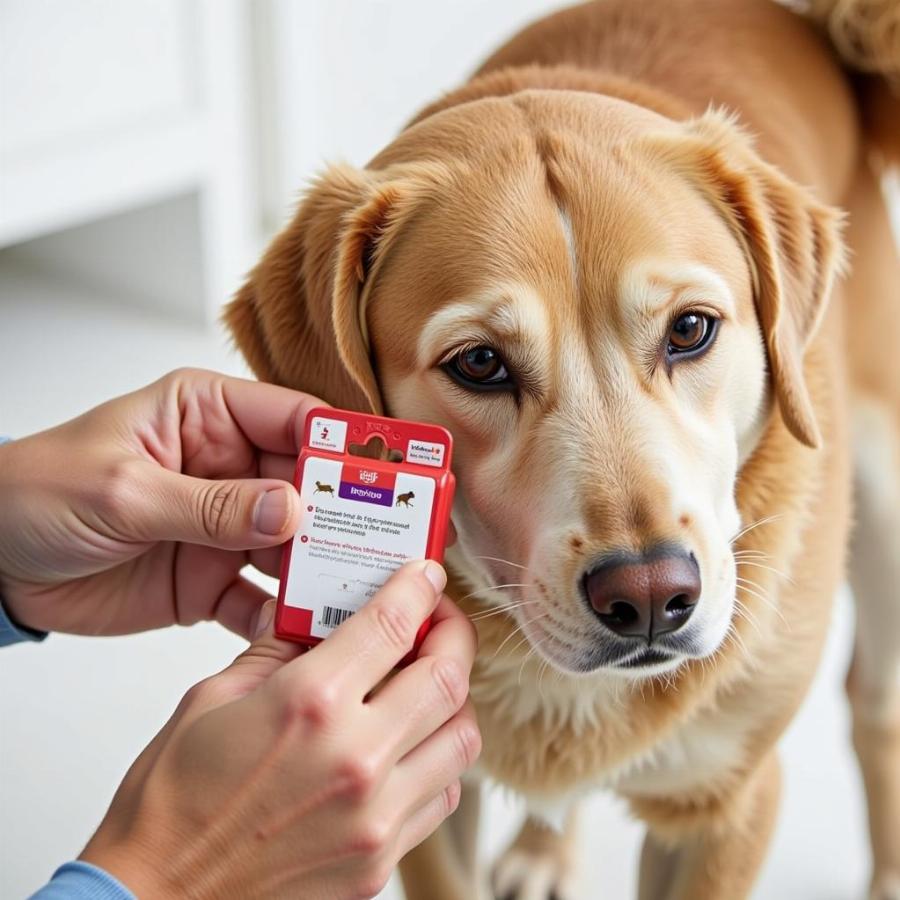Bug spray is essential for outdoor adventures, especially during warmer months. But as a responsible dog owner, you need to be extra cautious about the products you use around your furry friend. Many common bug sprays contain chemicals that can be harmful, even toxic, to dogs. This article will guide you through everything you need to know about bug spray and dogs, ensuring your pet stays safe while enjoying the great outdoors.
Understanding the Risks of Bug Spray on Dogs
The most common active ingredient in many insect repellents is DEET (N,N-Diethyl-meta-toluamide). While generally safe for humans, DEET can cause a range of problems in dogs, including vomiting, tremors, seizures, and skin irritation. Other chemicals like permethrin, often found in sprays targeting ticks and mosquitoes, are particularly dangerous for dogs and can lead to even more severe reactions. Even natural bug sprays can cause issues if they contain essential oils that are toxic to dogs, such as tea tree oil, pennyroyal oil, and wintergreen oil. Therefore, it’s crucial to choose a bug spray specifically formulated for dogs or opt for alternative methods to protect them from pests.
Choosing Safe Bug Sprays for Dogs
When selecting a bug spray for your dog, look for products that contain vet-recommended ingredients like pyrethrins or fipronil. These are generally considered safe for dogs when used as directed. Always read the label carefully and follow the manufacturer’s instructions precisely. Avoid using human bug sprays on your dog under any circumstances.
Spot-on Treatments and Collars
Besides sprays, spot-on treatments and collars offer convenient and effective protection against fleas and ticks. Many options are available, so consult your veterinarian to determine the best choice for your dog’s breed, age, and health condition. Remember to apply these products as directed to prevent any adverse reactions.
 Applying Spot-on Flea and Tick Treatment to a Dog
Applying Spot-on Flea and Tick Treatment to a Dog
Natural Bug Repellent Options for Dogs
For those seeking natural alternatives, consider using a diluted apple cider vinegar spray. Although not as potent as chemical repellents, it can help deter some insects. You can also create a natural bug repellent by mixing specific essential oils safe for dogs, like citronella or lavender, with a carrier oil like coconut oil. However, always consult with your veterinarian before using essential oils on your dog, especially if they have any underlying health conditions.
Protecting Your Dog From Bugs Without Sprays
Beyond bug sprays, several other strategies can help keep your dog pest-free. Regular grooming, including brushing and bathing, can help remove fleas and ticks. Keeping your yard clean and free of debris can minimize breeding grounds for insects. You can also consider using mosquito nets and screens on windows and doors to prevent bugs from entering your home. mosquito yard spray safe for dogs is also a good option to keep your dog’s outdoor environment safe from mosquitoes.
What to Do if Your Dog is Exposed to Harmful Bug Spray
If you suspect your dog has been exposed to a harmful bug spray, watch for signs like excessive drooling, vomiting, tremors, or difficulty breathing. Immediately contact your veterinarian or an emergency animal hospital. Quick action can be life-saving in cases of bug spray toxicity.
Conclusion
Keeping your dog safe from bugs doesn’t have to be complicated. By choosing dog-safe products, exploring natural alternatives, and implementing preventative measures, you can protect your furry friend from harmful chemicals while ensuring they enjoy the outdoors pest-free. Remember, always consult with your veterinarian for personalized advice on the best bug repellent options for your dog.
FAQ
- Can I use human bug spray on my dog? No, human bug sprays often contain DEET and other chemicals that are toxic to dogs.
- What are the signs of bug spray toxicity in dogs? Signs can include vomiting, tremors, seizures, drooling, and difficulty breathing.
- Are there natural bug repellent options for dogs? Yes, diluted apple cider vinegar and certain dog-safe essential oils can be used as natural repellents.
- What should I do if my dog is exposed to harmful bug spray? Immediately contact your veterinarian or an emergency animal hospital.
- How can I prevent bug infestations in my yard? Keep your yard clean, remove debris, and consider using pet-safe mosquito yard sprays. You might also consider natural remedies to remove fleas. how to get rid of fleas on dogs natural remedies contains more information.
- Are there any alternatives to bug spray for dogs? Yes, spot-on treatments, collars, protective clothing, and mosquito nets are effective alternatives.
- What’s the best way to choose a safe bug spray for my dog? Consult with your veterinarian and look for products containing vet-recommended ingredients. If your dog has hot spots, you may also need to consider hot spot spray for dogs.
Further Reading
- Bed Bug Bites on Dogs: bed bug bites on dogs
Beaut Dogs is your trusted source for all things canine, offering expert advice on dog breeds, care, and training. We’re passionate about helping you provide the best possible life for your furry companions. When you need support, please contact us via Email: [email protected] to get detailed and accurate answers from Beaut Dogs. Visit Beaut Dogs today to learn more!